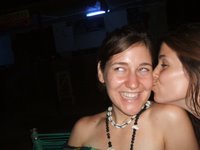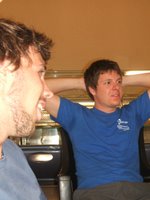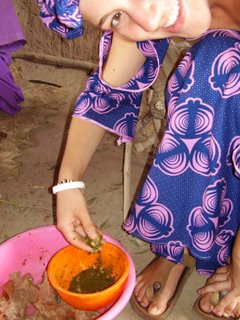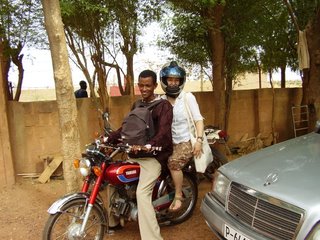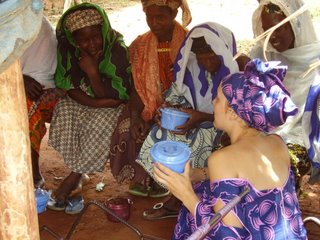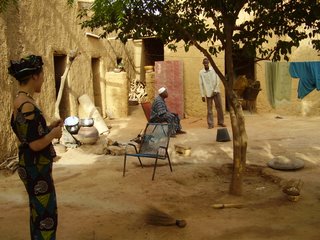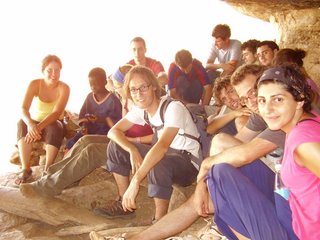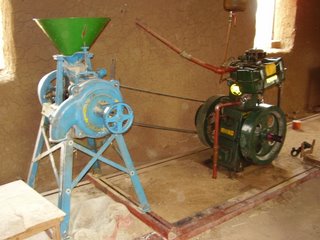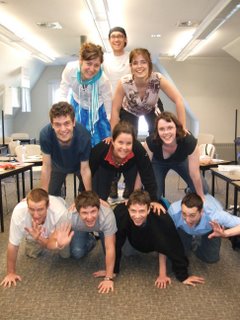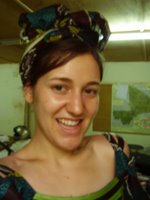
Notre séjour dans "la brousse"
So I have a lot of catching up to do… First, I need to share our 3 day escape to Sido. Three of the five Junior Fellows who ended up in Bamako were scheduled to work on the Mali Multifunctional Platform (MFP) Project. Rest assured, more details on this amazing project will surely come in my next entry. Well, it turns out we made it into the country exactly a week before the sub-regional workshop held in Bamako. Now, what I had in mind for such a sub-regional activity was nothing huge. This is why I was rather surprised to get here and find out that my project and responsibilities for the summer had not been discussed in much detail due to lack of time... because of the crazy planning for this event!
I will attempt to make an analogy that will perhaps illuminate a few of you. Imagine an intern starting a position at the EWB national office one week before the yearly national conference. Everyone in the National Management Team, without exception, is running around like a chicken with no head trying to get organized. If you’re thinking that this isn’t a problem, and that all you need to do is send the poor intern to spend some time with chapter members in a university close by, think again. Clearly, chapter members across the country are busy putting together presentations that the Director of Chapter Development (or whatever Chad was) is demanding for end-of-week…
So it turns out this sub-region that the workshop was targeting is actually all of the West African countries participating in the MFP project. In other words, try to picture three of us in a similar pickle as this poor EWB intern filled with good intentions. Believe it or not, this is how we turned a few days of downtime into an amazing learning opportunity. Please let me introduce Mike, a cool chap from PEI and long term overseas volunteer based in Sévaré where I am also supposed to be based, at this point, for the summer. Jean-Luc, Véro and Mike came up with this fantastic plan of splitting the group into two teams. Each team is to make a surprise visit to a random rural community and to spend 3 days with the locals to learn about their way of life. The idea was clearly to get out of Bamako and live the real Malian experience while we had a chance. You may care to note that three quarters of the Malian population is located in rural areas, hence why the city life cannot itself fulfill our desire to understand the true Mali. Mike, who has been working on the MFP project since February and who will be doing so long after my return to Canada, suggested two random villages equipped with a platform.
I am still under the charm of the hospitality of the villagers of Sido. We were welcomed and treated like family, though they had previously never heard of EWB before. We explained to the mayor and dugutigi (chief of the village) who we are, our plans for the summer, and expressed our desire to spend some time in their lovely community alongside villagers to participate and learn. We explained that it would be extremely helpful for us to feel and understand the reality of the people we are truly trying to help through our work here in Mali and back home. They were absolutely enchanted and impressed at our preference to stay with locals overnight rather than to settle between the tall walls of the Mairie.
Within five minutes of hopping off the bus, I was given my Malian name: for the next three months, you can call me Awa Doumbia. It turns out that my name sounds very much like the word “yes” in Bambara, which is “owo”. And this word clearly comes up a lot, so I end up looking around to see if anyone is trying to get my attention every time that somebody agrees with another. If you’re thinking: “Come on, Cat, the world doesn’t revolve around you, nobody must know your name by now, anyways…”, well, I have news for you! People around here remember our names oh-so-quickly. They find it so entertaining that I have a Malian name, and kids and adults yell my name when I walk around the neighbourhood. It’s funny how the colour of your skin can turn you into a star overnight… The fact that I misunderstand the word “owo” 50 times a day as a call for my attention actually reminds me of math lectures in high school. I would hear the digit 4 in French, “quatre”, and always jump up on my seat thinking the teacher was about to ask me to shut up in the back row… You know. Quatre… Catherine…
Well, moving on. It took me a few hours to realize that the great majority of the residents of this community are Doumbia’s. It is apparently a custom here to rename foreigners, perhaps to make everyone’s life (but ours) simpler. Here is how it makes things a bit complicated for us newcomers. There is a very interesting phenomenon in Mali called “cousinage”, and my best attempt at a translation will be “the cousin thing”. Every last name comes from a specific ethnicity and hence comes with a great deal of history. Certain family names are therefore slaves of another family, and so on. This is all a big joke, and though it may have come from a truthful base, no one will take out a whip and claim another to be his slave. They simply kid around and tease each other according to the status of their last names, saying things like: “I saw your wife cooking dog”, or “I saw you eating beans” and a lot of other funny quotes I don’t quite understand yet…
Actually, in Sévaré where I am now based, they very much dislike Doumbias, because they are metal workers and they were animists. I am absolutely terrible at handling this teasing and though I could easily come up with random insults, they would likely be irrelevant. So for a while I just told everyone that they were hurting my feelings. I could tell that I was kind of ruining the game, but I didn’t want to blurt out something hurtful in return! But when I went to get my visa renewed, I met a kind lady who told me why all these people seemed to have a beef with my folks, and more importantly how to respond. Apparently the majority of the population around here is Peul, and these people are shepherds. All I have to do is call them thieves because they stole my livestock, and that they cook their meal over dried animal doo-doo. Ha! Now that I think of it, respect to them, for without them would have no walls…
During this stay in the village, I got to experience a lot of interesting “firsts”. I saw my very first multifunctional platform. You need to understand that I had been reading up on them for a while, finding out about the wonderful effects that it can have in people’s lives, and finally, I was standing next to one, wide-eyed. I also got to eat tô, which is a typical Malian meal of interesting texture that most households consume daily, and it is served with some kind of sauce. There are different varieties of sauce, including the Baobab tree leaves. Yummy… I will have to explain better when I can include a picture. For now, I have one word: gooey. Tô is supposed to be really difficult to cook, but my neighbour insists that I hang out with his wife to learn so that I can make some for friends and family in Canada. I got to mill grains manually for the first time. It didn’t last too long. The women would simply steal the tool away from me and laugh. Now I’m determined to purchase the necessary tools and prove myself that I can do it too. Sleep is overrated, anyways. On a more serious note, countless hours go into food preparation. It is a full time job. There is no way that I could manage a day job and come back home to cook dinner in the traditional way over a charcoal stove. Besides that, it was also my first time seeing walls made of cow poop and straw roofs, as well as using the hole as a toilet… Last but not least, I enjoyed my very first shivers in Mali early in the morning as I was having my first bucket shower of the summer!
I learned lots of the local language with kids, pointing at things and getting translations. They took out a cherished picture book that some other American toubab must have left them, and we looked through the beautiful images together looking for new words that they could teach me. At one point the ladies started pointing at my hair and their facial expressions weren’t too tactful in telling me that something had to be done. I couldn’t agree more, so I let one of my hosts have her way with my hair. She was braiding away as she was breastfeeding her child. Now that’s what I call multitasking! It took her about two hours to finish my cornrows. That’s right, cornrows! Those are the tight braids that stick to the scalp that have never looked good and never will look good on a white person. We were only halfway through the braids when the mayor called us in for a meeting. Way to make a good impression with my ghetto half braided hair straight out of a rap video… And this is the story of how I adopted the permanent head scarf.
The meeting with the mayor was an eye-opening experience. He had his entire council gathered for this meeting and we discussed about Engineers Without Borders, our individual projects and NGOs, and our goals for this surprise visit. In return they drew us a fair portrait of the situation of the community. They were so well aware of their strengths, needs and challenges that it made us all question for a moment how in the world we can come to this country and think that we have something to offer, especially knowing that we are far from being the kind of NGO that will dump a lump sum of money for a project and pack up.
The mayor spoke so eloquently about the importance of international cooperation and outlined the direct and indirect benefits on their community that we were encouraged nonetheless. They kindly asked us to write up a report summarizing our observations through this experience so they could capitalize on our fresh outlook. Véro pointed out that there were many more things for us to see to get a better grasp of their reality. They willingly agreed to guide us through their health clinic and school, where we had in depth conversations with staff and teachers.
Both of these stops offered shocking sights for my western eyes. Yet they walked us through with great pride, conscious of their advantage over the dozens of surrounding villages deprived of the proximity of such services. The health clinic was composed of five rooms, three of which were reserved for maternity care: the pre-natal room, the maternity room, and the post-birth room filled with beds and accompanying pink mosquito nets. My heart skipped a beat when my eyes met the baby bath tub filled with muddy water in the maternity room.
Another room was the “Magasin” with the refrigerator for vaccinations. It didn’t occur to me at the time because I was in a state of pure absorption rather than critical thinking, but this town is not electrified, so this refrigerator may actually be powered by batteries that the multi-functional platform charges every night. The last room was the pharmacy, with almost bare shelves from ground to ceiling. I had a peek at a jar that was at eye-level, and read the label to find out about some medication for venomous snake bites, which are apparently fairly common… Fantastic! So it seems as though the main activity in this clinic is maternity care. The other rooms of the clinic are filled with charts and old “Symptoms/Diagnosis/Medication” posters with the help of which the rest of the sores and pains must be identified and rectified. How dare do we complain endlessly about health care and refuse to step up when it’s time for our country to support Official Development Aid?
The school visit was another interesting experience. This was mid-afternoon on a Thursday and two teachers were hanging out in the middle of the school yard computing averages for end-of-year. This was exam period and only the grade six students had to write an examination that day, so most children were in the field helping to prepare for the shortly expected rainfalls. The teachers answered our questions and amongst other things discussed the difficulty to find and hire teachers, as well as their obligation to resort to an average of 110 students per teacher because of the sparse government resources invested in education. Their meagre budget goes towards teacher salaries and school materials, which are either inadequate or insufficient. The teachers attested that male attendance throughout the year is noticeably higher than female attendance because the girls’ help is required for the women of the household to accomplish their daily tasks.
I tried to take a quick peek at a classroom as the others were moving on quickly to another building, but I ended up staying a while to do a visualisation exercise. Or maybe it only felt like a long time. I stared at the school benches. Think cafeteria style, made of old wood, somewhat similar to the black and white school pictures of the olden days in Canada. I could not picture with all my might 110 kids packed in this room no bigger than our regular-sized classrooms for 30 students back home. Even the most patient teacher in North America with the best intentions would likely be tempted to crush fragile children fingers with a ruler in an attempt to discipline this kind of crowd I could imagine at that moment…
The last day of our visit, there was a village assembly organized to welcome a member of parliament for his passage through their community. Before the official beginning of the celebration, an old woman insisted that Noémie and I dance with her in the middle of the assembled crowd. We looked liked absolute fools but joined in with huge smiles that must have earned us forgiveness for sabotaging such an otherwise pretty sight. The villagers were amused and cheered us on, meanwhile I only had one wish to turn into an ostrich and dig my head into the sand. But then I started dangerously enjoying myself. You have all heard of the saying: “Dance like nobody is watching”. Indeed it makes the world of a difference. I have always loved to dance and this wasn’t about to change because a hundred people were staring (okay, and laughing)… Finally the three of us sat down for the beginning of a traditional dance with beautiful costumes and antelope masks. I sat in awe as two very fit local men danced ever dynamically to the sound of the djembes and traditional string instruments, watching the rivers of sweat stream down their beautiful dark skin. Jean-Luc explained to us that he had visited the museum in Bamako and seen such costumes exposed, but had thought to himself that he would unfornately never get the chance to see these worn. But all of a sudden these costumes were alive and performing an extraordinary dance in front of our eyes. I had butterflies in my stomach the entire time, and in fact they never left until I hopped on the boiling hot bus.
During the ride back to Bamako, I was determined to keep an eye out for the national brewery, which makes Castel, a decent blond beer. I am still a Molson girl after my 2 co-op terms at the Toronto brewery, and was curious to catch a glance of an African version. I missed it on the way to the village because it is so difficult to stay awake in this draining heat, and it was unfortunately no different upon our return. Another mid-day snoozefest to recharge my batteries!


